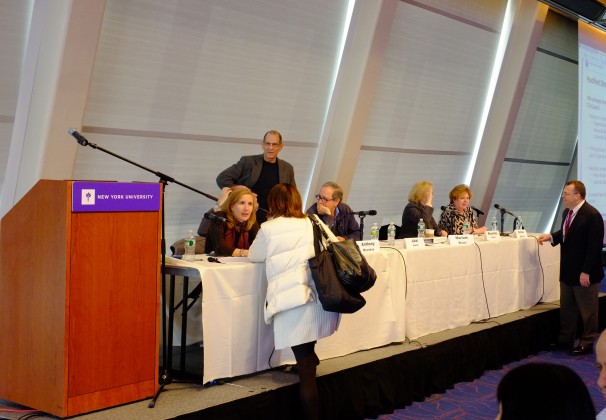
The first of three town hall meetings organized by the University Space Priorities Working Group convened yesterday to discuss space concerns regarding the university’s expansion plan.
The group, which met for the first time in October last year, included representatives from the faculty, Faculty Senators Council, Administrative Management Council and Student Senators Council.
Seven panelists of the Working Group Space Subcommittee presented a modified space plan that included a reduction in density and footprints of proposed buildings and greater open-space access. Afterwards, the subcommittee fielded questions from a faculty-heavy audience.
Many faculty concerns echoed the 35 department resolutions passed last spring that revealed uncertainty or disapproval of NYU 2031, including insufficient academic space and construction near faculty housing in the South Superblock.
“A lot of the work we have engaged in over the last six months flows directly out of the concerns and opposition that were expressed to the core plan last spring,” said Ted Magder, chair of the Working Group.
Few students attended the meeting, but those that did raised concerns regarding space allocations for Greek life, clubs and sustainable construction.
CAS senior Tammy Cho said that she and many students felt isolated from decisions on the expansion plans.
“The students haven’t really had an opportunity to say how they feel, not because they don’t have an opinion but because they don’t have a platform to really share their experience,” she said in a question to the panel.
Mariam Ehrari, SSC senator on the Space Subcommittee, responded that there are many access points for students such as University Committee on Student Life meetings and town halls with NYU President John Sexton. She explained that SSC conducted a survey to gauge the space needs for students and clubs.
After the town hall concluded, Ehrari elaborated on student representation within the Working Group. She said that despite having only two student representatives out of 27 total members, the non-student majority is responsive to the student perspective.
“I feel as if what we say resonates,” Ehrari said. “We’re bringing in a voice that didn’t even exist.”
However, Ehrari explained that unlike the faculty, which has departments, there is no established platform for senators to connect with students. Despite SSC efforts, reaching out to the NYU community remains a challenge.
“That’s probably the biggest failing of this process so far, of being able to — in a serious, structured fashion — solicit student input about this process and about what’s going on,” said Corey Blay, the other Working Group SSC senator. “I feel like students still have been left in the dark.”
The Financial Subcommittee town hall will take place tomorrow and the Quality of Life Subcommittee will be next Wednesday. The Working Committee will submit a resolution to Sexton in May.
Veronica Carchedi is city/state editor. Email her at [email protected].
























































































































































